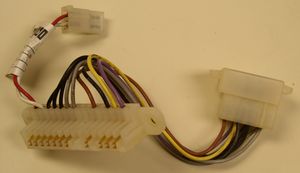Difference between revisions of "H765 Power System"
(Add failure info) |
(Add pics, link to customer page for board, move content there) |
||
| Line 5: | Line 5: | ||
Generally the [[power harness]] supports only a fixed arrangement as to which regulator can be in which spaces; e.g. the BA11-K harness mandates that #2 and #3 hold [[H744 +5V Regulator]]s, #1 holds an [[H745 -15V Regulator]], and #4 may hold an [[H754 +20V, -5V Regulator]]. | Generally the [[power harness]] supports only a fixed arrangement as to which regulator can be in which spaces; e.g. the BA11-K harness mandates that #2 and #3 hold [[H744 +5V Regulator]]s, #1 holds an [[H745 -15V Regulator]], and #4 may hold an [[H754 +20V, -5V Regulator]]. | ||
| − | + | [[Image:DEC 7010138 Harness.jpg|thumb|right|300px|7010138 harness]] | |
| − | + | A [[DEC Power Line Monitor|5411086 board]] in the H765 supplies a modest amount of +15V DC power to various backplanes mounted in the BA11-K, along with a [[line time clock]] signal, and AC and DC 'power OK' signals. A special 7010138 harness is used to connect the edge finger connectors of the 5411086 to the power distribution board in the BA11-K. | |
| − | + | The BA11-K harness used [[DEC power distribution connectors]] to provide power to standard backplanes; it normally used the [[DEC standard power wire colour coding]]. | |
| − | The H765 supported the standard DEC [[Remote Switching Control Bus]], so it could be turned off and on from a power switch elsewhere. | + | When the BA11-K is used in custom configurations to hold other sub-systems (such as the [[MJ11 memory system]] and [[MK11 memory system]]), other regulator configurations may be used, along with a custom main harness, and harness to the 5411086; e.g. the MJ11 calls for two H744's and two H754's. |
| + | |||
| + | The H765 runs off standard wall AC; it can be [[jumper]]ed to use either 110V or 220V supply. It supported the standard DEC [[Remote Switching Control Bus]], so it could be turned off and on from a power switch elsewhere. | ||
==Issues== | ==Issues== | ||
| Line 20: | Line 22: | ||
* [[H742 Power Supply]] | * [[H742 Power Supply]] | ||
| − | |||
| − | |||
| − | |||
| − | |||
[[Category: DEC Hardware]] | [[Category: DEC Hardware]] | ||
Revision as of 18:24, 10 June 2019
The H765 Power System is a modular power supply system from DEC, used in the BA11-K mounting box. In addition to main memory and device controllers on other PDP-11's, the BA11-K was used to hold PDP-11/04 and PDP-11/34 CPU's.
The main transformer in the H765 supplies 20-30V AC to several DEC standard modular regulators (up to four, in spaces numbered '1' through '4') mounted in the H765, which provide other voltages such as +5V DC to the backplanes in the mounting box.
Generally the power harness supports only a fixed arrangement as to which regulator can be in which spaces; e.g. the BA11-K harness mandates that #2 and #3 hold H744 +5V Regulators, #1 holds an H745 -15V Regulator, and #4 may hold an H754 +20V, -5V Regulator.
A 5411086 board in the H765 supplies a modest amount of +15V DC power to various backplanes mounted in the BA11-K, along with a line time clock signal, and AC and DC 'power OK' signals. A special 7010138 harness is used to connect the edge finger connectors of the 5411086 to the power distribution board in the BA11-K.
The BA11-K harness used DEC power distribution connectors to provide power to standard backplanes; it normally used the DEC standard power wire colour coding.
When the BA11-K is used in custom configurations to hold other sub-systems (such as the MJ11 memory system and MK11 memory system), other regulator configurations may be used, along with a custom main harness, and harness to the 5411086; e.g. the MJ11 calls for two H744's and two H754's.
The H765 runs off standard wall AC; it can be jumpered to use either 110V or 220V supply. It supported the standard DEC Remote Switching Control Bus, so it could be turned off and on from a power switch elsewhere.
Issues
Some components on the 5411086 board are not protected by a fuse; if they fail 'closed', since AC to that board enters through contacts on the edge connector, those contacts may be damaged.
